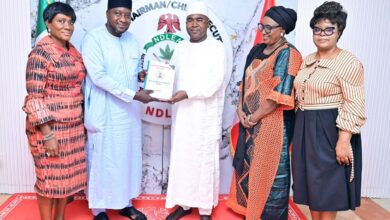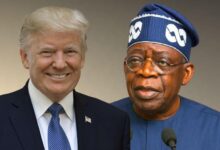Absa, Alliance Français partner on Emmanuel Idowu’s Echoes of Innocence

By BASHIR ADEFAKA
“At Absa, we try to help those artists navigate that terrain. If you are an artist, you need international exposure. You need mentorship. You need support. And that is what Absa, through the L’Atelier competition, strives to do.”
In continuation of its avowed objective of supporting talented Nigerian artists, Absa, in partnership with Alliance Française, on Saturday January 5th, 2025 opened its doors to guests. The event, held at the Mike Adenuga Centre in lkoyi, Lagos, turned out as a special evening of storytelling and impactful display of contemporary art. Titled Echoes of Innocence, the solo Exhibition by 2023 Absa L’Atelier Ambassador, Emmanuel Idowu, made an impression of art lovers gathered at the venue through an interplay of painting, sculpture and symbolism. With the show, Emmanuel was able to reflect on his childhood as well as topics such as identity and Yoruba cosmology in a deeply moving exploration of memory and imagination.

The vibrant celebration of creativity, marking the successful public presentation of Echoes of Innocence, a compelling solo exhibition by Emmanuel Idowu on Saturday July 5th, 2025, was facilitated through a collaboration between Absa L’Atelier and Alliance Française Lagos.
As the 2023 Ambassador of Absa L’Atelier, Idowu deployed the exhibition as a platform to revisit his past and express his experiences in a poetic and emotionally resonant manner, with the exhibition forming part of Absa’s 2025 Pan-African Gallery Exhibition Series, which aims to spotlight emerging voices in African contemporary art.
The event stood out, in part due to the remarkable attendance of guests it attracted as the friendly climate mixed with the enthusiasm of invited guests to evoke deep connection between desire and praise for Idowu’s talent as attendees navigated the captivating visual display of artworks. The pieces were deeply informed by Yoruba mythology, bridging Idowu’s personal narrative with broader cultural themes while also reflecting elements from his upbringing amidst cocks, trees, and flowers. An unusual show which presented a poetic landscape where passion and responsibility intertwined, the works were meticulously arranged against shining white walls, creating a refined atmosphere that allowed ample room for guests to appreciate each piece.
Graced by several dignitaries including Sadiq Abu, the Country CEO of Absa Group; Director, Alliance Française de Lagos, Marc Brebant; Absa Senior Specialist, Art and Museum Curator, Dr. Paul Bayliss; the artist, Emmanuel Idowu, among others, the neat display of works complemented the exhibition’s aesthetic outfit to provide an engaging experience for art enthusiasts.
Marc Brebant, Director of Alliance Française de Lagos, one of the leading cultural institutions on the African continent, kicked off the event with remarks appreciating the collaboration between Absa and others which complements the efforts of Alliance Français de Lagos toward the development of the creative arts scene in Nigeria and globally.
Looking at Emmanuel’s artistic trajectory, the Echoes of Innocence not only highlighted Idowu’s artistic journey but also underscored Absa’s commitment to fostering creativity and supporting emerging African artists. For Absa, the exhibition marked another significant step in the promotion of contemporary African art on a global stage.
In this exhibition, ldowu explores the intricate relationship between memory and time, capturing the blurred moments between the past and the present. Using impressionism and colour separation, the artist creates a visual language that not only captures the essence of childhood but also prompts reflection on how these formative memories shape our adult lives.
The show is a deeply personal series where Emmanuel invites arts enthusiasts into his childhood where joy and struggle combine in almost equal measure and where memories linger, shaping our sense of self. Here, Idowu presents an illustration of children on a swing, climbing a rope, while exploring the innocence and joy of the memories of growing up.
Through the works, he evokes memory of ‘old” and the carefree moments of what it meant to be young. According to the artist, the theme was inspired by “Boy on a Swing”, a poem by Oswald Mbuyiseni Mtshali. Going down the memory lane, Idowu said Mtshali was a South African-born poet who grew up in the 1940s and 50s and experienced firsthand the racial segregation and oppression that characterised South Africa’s apartheid regime.
Through his poem, and other works including the highly regarded “Nightfall in Soweto”, Idowu joins Mtshali in evoking a powerful sense of nostalgia and contemplation of childhood while reflecting on the innocence of youth and the passage of time.
The swing serves as a symbol of childhood innocence and freedom, as is often the case with art, there are stories behind every painting. The painting of children climbing ropes symbolises resilience, determination, and the journey toward achieving bigger dreams and a brighter future through daily struggles for liberation. On the other hand, it symbolises innocence, juxtaposing them with the harsh realities of life, including questions about identity, our belonging in the world and family dynamics, such as parental absence and familial relationships.
Beyond the central figures in each of the artworks, Idowu incorporates objects to enhance each of the work’s impact, with each imagery either of books, flower baskets or chickens pregnant with symbolic meaning and representing a different aspect of time and memory while capturing youthful vulnerability and the fleeting nature of childhood.
The flower baskets, filled with delicate blooms, evoke the fleeting beauty of childhood moments, that blossom and fade, just as the chickens are tied to the rhythms of rural life and Yoruba culture; symbolising continuity, transformation, and the passage of time. The books serve as a vessel of knowledge, reflecting the formative nature of childhood learning and experience.
In each artwork, colour plays a crucial role in setting the emotional tone. A dominant pink palette, rooted in Idowu’s connection to red, a foundational colour in his work, is balanced by light yellow ochre, creating a warmth that reinforces themes of nostalgia and reflection.
Lastly, the inspiration is grounded in Yoruba philosophy and storytelling. The Yoruba proverb, “Agba wa bura” (Can an elder swear he or she was not once a child?) highlights the cyclical nature of life and how childhood and adulthood are interconnected. Additionally, the Yoruba creation myth of Oduduwa, who descended with a rope, a chicken, and sand to form the land of Ile-Ife, the cradle of creations. The chicken, in particular, represents the continuous cycle of time, transformation, and existence. Similarly, the flower baskets are inspired childhood memories of sucking the sweet nectar from Cascabela thevetiai (yellow oleander) flowers, symbolising moments of innocence, wonder, and fleeting beauty.
The man of the moment, Idowu, who wears many caps – visual artist, illustrator and painter – expressed gratitude to Absa and Alliance Française de Lagos for supporting his talents during his remarks. According to him, the show was his first solo exhibition in Nigeria. While stating how he was inspired during his sojourn in South Africa, said: “I am happy to be here. I am happy with the body of work that I have been able to put together to display to the audience. The inspiration behind this body of work was when I travelled to South Africa for my artist residency. I was opportune to visit the Apartheid Museum.
“And there was where I conceived the idea of The Boy on the String, a poem written by Oswald M. Shiley, a South African poet. I learned about this poem during my childhood, during my secondary school days, while preparing for WAEC and NECO. But getting to South Africa to see the real story about this poem, then I conceived this idea to create a piece of artwork that would illustrate The Boy on the String. Then of course, it explores the theme of nostalgia and childhood memories.”
Speaking further, Idowu said, “It explores the theme of growing up as a Yoruba boy. The methodology, the idea that we conceived, the information that was passed to us from one generation to another, that was what helped me to be able to create this work. In creating this work, how do I represent a memory of lost time or the memories of the past? I remember this beautiful flower. Then the chickens represent the passage of time. The passage of time in the sense that before the advent of wristwatch and wall clock, it is chickens and cocks that race around.
“There were forefathers who knew that, ‘okay, it is daybreak, it is afternoon, it is morning.’ So, they use the chickens and cocks to gauge or to calculate the time frame. So, these are the ideas that helped me create this body of works. Nurturing and showcasing talents have been part of Absa because l was working at my own space. I was comfortable in the studio but Absa L’Atelier gave me master classes and mentorship sections that have shaped me in my artistic journey.”
On while his organisation continues to support Nigerian talented artist, Absa CEO in Nigeria, Sadiq Abu, said Absa and creativity are intertwined. I represent Absa, and in Absa, art is more than just art; l think art is part of our ethos, which is a force for good. And we also believe that through art, you can tell your story. And for us at Absa, your story matters.
“And we try to demonstrate that by showcasing the best of African talent through art. We have been working with the L’Atelier organisation for about 39 years, focusing exclusively on African art and increasingly on West African art. And we have used that medium to promote West African artists and indeed Nigerian artists who have demonstrated the extraordinary strength of creativity through their works. And we continue to do so.
“If you look at Nigeria right now, the creative sector is becoming an increasingly active part of the GDP of Nigeria, right? And therefore, it is in our interest to promote both the creative side as well as the economic side. And if you put creativity and the economy together, you can see that there is increasing synergy between the two. At Absa, we see the creatives as a big part of what the GDP of this country is going to be. You are seeing it in music. You are seeing it in art. You are seeing it in fashion. You are seeing it in Nollywood. You are seeing it in plays. And so, there is a whole ecosystem around the creatives that are going to contribute an immense part of what Nigeria will become as an economic powerhouse. And Absa is incredibly proud to be partnering with an aspect of that creative ecosystem, which is the arts, and bringing through the system promising young talent like Emmanuel Idowu today, like Raji Bamidele last year, and indeed like Taofik Baduru last month,” he stated.
According to Abu, there are challenges and Absa is helping the artists to navigate them. “At Absa, we try to help those artists navigate that terrain. If you are an artist, you need international exposure. You need mentorship. You need support. And that is what Absa, through the L’Atelier competition, strives to do. We provide these artists with mentorship through the residency in South Africa, through this gallery exhibition.
“We think that if we can shine a light on a number of these young artists, other corporate organisations, other art lovers, other enthusiasts will also join us in that journey and promote the arts the way Absa is doing.”
Corroborating Abu, Paul Bayliss said he is happy to be back to celebrate the success of Emmanuel Idowu who was L’Atelier Ambassador in 2023.
“You know, part of the award is a solo exhibition and really I am here to celebrate in his success as he’s put together this really wonderful body of artworks for us to enjoy. This is evoking our memories. Emmanuel idowu’s art is almost forcing us as adults to revisit our childhood. So often as we grow up as adults, we forget our childhood. We forget the inspirations, our dreams of what we had when we were young. And he is forcing us back to almost remember that. But what he has done very well is he has captured it in an African tradition. He is remained true to his roots as a Nigerian artist and in terms of who he is, in terms of his Yoruba culture and so on.
“By using the skill and the techniques, his artwork is very much reflective of the old renaissance painters that came out of Europe. So, he’s combined the technique and that skill while remaining true to his Nigerian roots. And I think that is really what separates him from his peers and places him onto a continental and eventually a global stage.
“As Absa person, we are celebrating our young creators and artistic talents on the continent. We are allowing them to share their stories. But at the same time, we also weigh the impact that creators have on the economy of a country. You know, in terms of, if you think of performers, actors, artists, digital creators at the same time, they are creating works that become investment pieces in years to come. So, through these works as well, you are also creating wealth amongst our clients and so on that would like to invest and purchase these works at the same time. But, you know, we also need to look at, as a financial institution, how we invest back into the communities where we operate, how we support those communities and enable them to tell the stories and reach the best of who they are. And one of the ways of doing so is supporting our creators and our young artists.
And that is what we are doing. And at the same time, through the Absa Latelier, we are placing our artists on a global stage. We are saying to the world, we have got some of the best artists, the best creators in the world on this continent. And we need to start celebrating the best of what Africa has to bring to the world. And this is what this exhibition is about. It’s a celebration of a young artist who’s going to be on the global stage.”
“Emmanuel Idowu continues to tell the African story, while capturing the universal experience of growing up and grappling with the complexities of life. To him, as he has reached out and grasped the four cardinal points of this great continent, I say congratulations on a magnificent exhibition.









